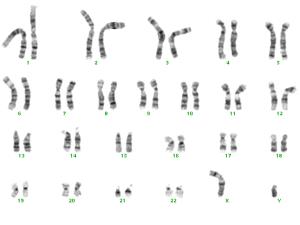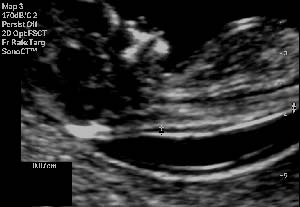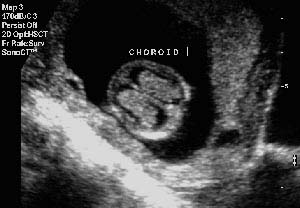Nuchal Translucency Testing
A New Early Pregnancy Test for Fetal Wellbeing NT-plus is a simple, straightforward and non-invasive test undertaken at 11-14 weeks in pregnancy. It combines maternal age with high-resolution ultrasound assessment of fetal nuchal translucency (NT) and the levels of two proteins (free-BhCG and PAPP-A) in a pregnant woman's blood. Chromosome abnormalityAll our genetic information is packed into strands of DNA called chromosomes. Normally there are 46 chromosomes in every cell. Sometimes the number or arrangement of chromosomes is abnormal - the commonest problem being Down syndrome. Any woman who falls pregnant can have a child with a chromosome problem, but the risk increases with age.What is Nuchal Translucency?Normal fetuses accumulate fluid under the skin behind the head and neck between 9 and 14 weeks of pregnancy. If there is excess fluid it has been associated with chromosome abnormalities such as Down syndrome.A simple ultrasound performed between 11 and 13 weeks can measure this fluid (Nuchal Translucency). The gestational age of the fetus can be established by measuring from head to bottom - crown rump length ( CRL ). The NT tends to be larger in a fetus affected by a chromosome abnormality and it can be compared with what is expected for a fetus of the same size. |
|
PAPP-A and BhCG
PAPP-A (Pregnancy associated plasma protein-A) and BhCG (Beta human chorionic gonadotrophin) levels can be assessed from a simple blood test taken from the mother either before or on the same day as the Nuchal Translucency ultrasound is performed. The level in the mother's blood can be compared to the level expected in a pregnancy at the same gestational age. The NT tends to be larger in a fetus affected by a chromosome abnormality and it can be compared with what is expected for a fetus of the same size ( BhCG and PAPP-A levels )Our practice is directly linked to the laboratory. This enables the blood test to be taken and the Nuchal Translucency assessed, then the combined results are available that same day.
The addition of this blood test increases the detection rate from 80% up to 90%.
An additional 10% detection means that half of the Down syndrome affected pregnancies not being detected by mother's age and Nuchal Translucency alone, are now able to be found with the additional information from the blood test. Women whose result falls into the increased risk zone will be offered further prenatal testing (by CVS or amniocentesis).
The PAPP-A level tends to be lower and the BhCG level tends to be higher in pregnancies affected by Down syndrome ( levels seen in low and high risk patients and those with a Down syndrome affected pregnancy ). When this information is combined with the mother's age and the Nuchal Translucency measurement, an increased risk group can be established, which has been shown to contain 90% of the Down syndrome affected pregnancies. We call this "NT-Plus".
Other benefits of an 11 - 13 week scan
|
|
Information Brochure
 |
NT - plus ~ Early Pregnancy Assessment for Fetal Wellbeing NT - plus is an innovative procedure that can help detect chromosome abnormalities (eg. Down syndrome) that may occur during pregnancy. Most abnormalities of the babies structure can also be detected. |





